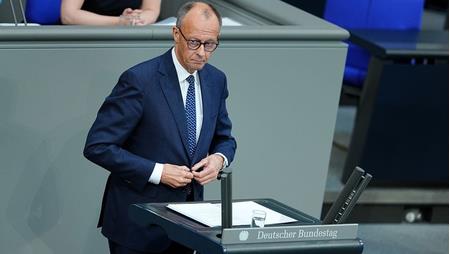
Germany's New Chancellor Pledges Strong Defence, Economic Revival
Delivering his first major speech as Chancellor in the lower house of Parliament on Wednesday, Merz outlined the policy agenda of his coalition government, formed by the Christian Democratic Union/Christian Social Union (CDU/CSU) and the Social Democratic Party (SPD).
During the speech, he declared the strengthening of the Bundeswehr -- Germany's armed forces -- a top priority, Xinhua news agency reported.
He committed to providing the necessary resources for it to become the most powerful military force in Europe.
As part of the coalition agreement between the CDU/CSU and the SPD, the parties have decided to exempt defence spending exceeding one per cent of GDP from the constitutional debt brake, allowing for more flexible funding of military needs.
Turning to the economy, Merz acknowledged that Germany is currently in recession.
He identified excessive bureaucracy, high energy costs, and a burdensome tax regime as key obstacles to growth.
To counter these challenges, he pledged a return to economic expansion through investment and structural reforms.
The focus, he said, would be on boosting competitiveness and safeguarding jobs.
The coalition also agreed to establish a 500-billion-euro ($560 billion) fund aimed at supporting infrastructure development and climate initiatives.
Merz further underscored the importance of attracting private investment while maintaining a prudent stance on public debt.
After the start of Russia's full-scale invasion of Ukraine, then-Chancellor Olaf Scholz said the process would "probably" make Germany "the largest conventional army" among NATO's European allies.
Merz emphasised his desire to keep the Trump administration on board with support for Ukraine, adding that he spoke with President Donald Trump twice recently and was grateful for his support for an unconditional 30-day ceasefire.
The German military suffered from years of neglect before Scholz, shortly after Russia launched its full-scale invasion of Ukraine in 2022, pledged to increase Germany's defence spending to the current NATO target of two per cent of GDP and announced the creation of a 100 billion-euro special fund to modernise the military.
Germany met that target thanks to the fund, but it will be used up in 2027.
Merz said that "we will fulfill our commitments" in Germany's interest and that of NATO, but didn't address US demands for allies to raise their defence investments to five per cent of GDP.
Merz acknowledged that Germany's security and influence in the world "stand and fall with our economic strength".
He pledged to roll back bureaucracy, advance digitisation, provide tax breaks for companies and promote more EU trade agreements.
"We will do everything to get Germany's economy back on the course of growth," he said.
"We want to invest and reform ... through our own efforts, we can once again become a locomotive of growth that the world looks at with admiration."

Legal Disclaimer:
MENAFN provides the
information “as is” without warranty of any kind. We do not accept
any responsibility or liability for the accuracy, content, images,
videos, licenses, completeness, legality, or reliability of the information
contained in this article. If you have any complaints or copyright
issues related to this article, kindly contact the provider above.


















Comments
No comment